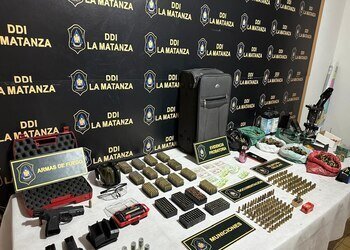The discovery of a clandestine ammunition factory capable of producing and distributing thousands of homemade bullets exposes how the lack of traceability for firearms and ammunition in Argentina remains a key vulnerability exploited by criminal groups.
In April, police arrested two men under investigation for their involvement in a robbery in Ciudadela, west of Buenos Aires. During one arrest, officers uncovered an illegal workshop capable of manufacturing thousands of homemade bullets. Authorities seized more than 10,000 cartridges, as well as various materials, machines, and tools for crafting artisanal ammunition.
SEE ALSO: Argentina’s Evolving Role in the Global Arms Trade
The investigation revealed the munitions were sold on the black market to unidentified local criminal gangs involved in drug trafficking in La Matanza, Greater Buenos Aires. Due to the higher cost and difficulty of obtaining industrial ammunition, criminal networks sometimes resort to supplying themselves.
“It is a way to make up for shortages: although the bullets do not have the same quality as industrial ones, their low cost allows these groups to access larger quantities,” an Argentine official specializing in arms policy told InSight Crime.
InSight Crime Analysis
Clandestine ammunition manufacturing in Argentina is a growing threat, although criminal groups mostly continue to rely on the legal market, which suffers from poor traceability and endemic corruption.
Artisanal workshops are relatively common in Argentina, especially among sport shooters, as it allows them to re-supply at a lower cost compared to buying new bullets. But although this practice could be exploited by criminal groups due to limited oversight, it is not the main source of their ammunition.
In fact, criminal groups most often buy ammunition directly from the legal market. In May 2021, for example, authorities seized 3,500 legally sourced bullets during a police operation in Rosario.
“Today, it is easier for a criminal organization to hire marginalized individuals, provide them with fake documents, and obtain legal permits to buy ammunition at gun shops. They don’t need to manufacture bullets or get gunpowder: they buy ‘clean’ with a permit and some cash,” the official told InSight Crime.
People routinely acquire weapons for criminal groups through family, friends, or employer-employee ties, said Gastón Ávila, head of the Strategic Firearms Approach Task Force, in an interview with Suma Política.
Corruption and weak oversight of Argentina’s various security forces makes this problem worse. Corrupt elements in these agencies have at times supplied criminal groups with ammunition through illegal diversions — a pattern also seen in other countries in the region.
SEE ALSO: How Corruption Fuels Arms Diversion in Latin America
During raids on clandestine gun shops across several parts of Buenos Aires in June 2024, for example, authorities found boxes of ammunition labeled with red tags to indicate they were to be used exclusively by security forces. Police arrested three officers for illegally supplying weapons and ammunition to criminal gangs.
Although Argentina has one of the lowest homicide rates in the region, almost 60% of intentional homicides in 2023 were committed with firearms. However, there is a lack of reliable data on the number of firearms and ammunition circulating nationwide.
According to the National Controlled Materials Agency (Agencia Nacional de Materiales Controlados – ANMaC), more than 1.8 million firearms were legally registered in 2024, compared to the estimated 3 million in circulation. Currently there is no registry or traceability mechanism for ammunition, which undermines control over the legal industry while feeding the black market and the use of firearms.
“Traceability of large batches can be done, but the cost of marking each bullet, while possible, is very high, and it would require a regional agreement,” said Pía Devoto, director of the Association for Public Policies (Asociación para Políticas Públicas – APP) and an expert in arms control.
“Today we don’t know how much ammunition or how many firearms there are in Argentina. You cannot manage what you don’t know,” she added. “To combat diversion — whether of arms or ammunition — controls must be strengthened, which requires human, financial, and technological resources. This may not be a true political priority given the complexity, opacity, and unclear legislation.”
*Creusa Muñoz contributed reporting to this article.
Featured image: Ammunition seized during a police operation in Ciudadela, Buenos Aires, in April. Credit: La Matanza Departmental Investigations Directorate (DDI).




